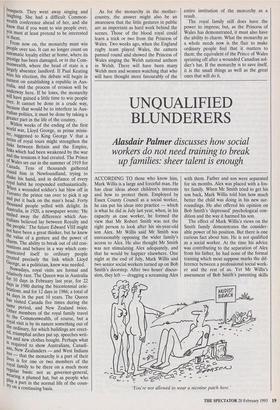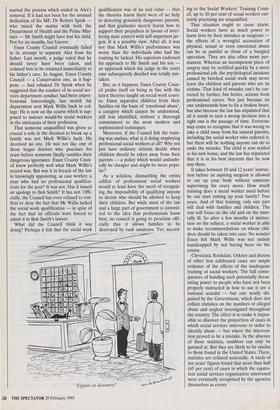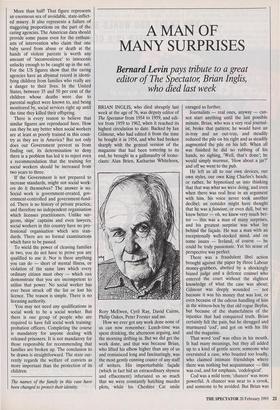UNQUALIFIED BLUNDERERS
Alasdair Palmer discusses how social
workers do not need training to break up families: sheer talent is enough
ACCORDING TO those who know him, Mark Willis is a large and forceful man. He has clear ideas about children's interests and how to protect them. Employed by Essex County Council as a social worker, he can put his ideas into practice — which is what he did in July last year, when, in his capacity as case worker, he formed the view that Mr Robert Smith was not the right person to look after his six-year-old son Alex. Mr Willis said Mr Smith was unreasonably opposing the wider family's access to Alex. He also thought Mr Smith was not stimulating Alex adequately, and that he would be happier elsewhere. One night at the end of July, Mark Willis and two senior social workers turned up on Bob Smith's doorstep. After two hours' discus- sion, they left — dragging a screaming Alex with them. Father and son were separated for six months. Alex was placed with a fos- ter family. When Mr Smith tried to get his son back, Mark Willis told him how much better the child was doing in his new sur- roundings. He also offered his opinion on Bob Smith's 'depressed' psychological con- dition and the way it harmed his son.
The effect of Mark Willis's views on the Smith family demonstrates the consider- able power of his position. But there is one curious fact about him. He is not qualified as a social worker. At the time his advice was contributing to the separation of Alex from his father, he had none of the formal training which most suppose marks the dif- ference between a professional social work- er and the rest of us. Yet Mr Willis's assessment of Bob Smith's parenting skills `You're not allowed to wear a nicotine patch here.' started the process which ended in Alex's removal. If it had not been for the unusual dedication of his MP, Dr Robert Spink who raised the matter with both the Department of Health and the Prime Min- ister — Mr Smith might have lost his child. Not for six months, but forever.
Essex County Council eventually failed in its attempt to separate Alex from his father. Last month, a judge ruled that he should never have been taken, and ordered him to be returned immediately to his father's care. In August, Essex County Council — a Conservative one, as it hap- pens — had rebuked Dr Spink when he suggested that the conduct of its social ser- vices department conduct had been unpro- fessional. Interestingly, last month the department sent Mark Willis back to col- lege. He is now on the course which is sup- posed to instruct would-be social workers in the intricacies of their profession.
That someone unqualified was given so crucial a role in the decision to break up a family was not Mark Willis's fault. He deceived no one. He was not like one of those bogus doctors who practises for years before someone finally rumbles their dangerous ignorance. Essex County Coun- cil knew perfectly well what Mark Willis's record was. But was it in breach of the law in knowingly appointing, as case worker, a man who had no professional qualifica- tions for the post? It was not. Has it issued an apology to Bob Smith? It has not. Offi- cially, the Council has even refused to con- firm or deny the fact that Mr Willis lacked the social work qualification — in spite of the fact that its officials were forced to admit it to Bob Smith's lawyer.
What did the Council think it was doing? Perhaps it felt that the social work qualification was of no real value — that the theories learnt there were of no help in detecting genuinely dangerous parents, and that graduates merely learnt how to support their prejudices in favour of inter- fering state control with self-important jar- gon. It is a possible view. After all, it was not that Mark Willis's performance was worse than the individuals who had the training he lacked. His superiors endorsed his approach to Mr Smith and his son an approach which the judge in the court case subsequently decided was totally mis- taken.
But, as it happens, Essex County Coun- cil prides itself on being in tine with the latest theories taught on social work cours- es. Essex separates children from their families on the basis of 'emotional abuse', a category which cannot be understood, still less identified, without a thorough commitment to the most modern and sophisticated techniques.
Moreover, if the Council felt the train- ing was useless, what is it doing employing professional social workers at all? Why not just have ordinary citizens decide when children should be taken away from their parents — a policy which would undoubt- edly be cheaper and might be more popu- lar?
As a solution, dismantling the entire,, edifice of professional social workers would at least have the merit of recognis- ing the impossibility of qualifying anyone to decide who should be allowed to keep their children. But while most of the law and a large part of government is commit- ted to the idea that professionals know best, no council is going to proclaim offi- cially that it allows families to be destroyed by rank amateurs. Yet, accord- ing to the Social Workers' Training Coun- cil, up to 20 per cent of social workers cur- rently practising are unqualified.
That situation ought to cause alarm.
Social workers have as much power to harm lives by their mistakes as surgeons - the effects of a wrongful accusation of physical, sexual or even emotional abuse can be as painful as those of a bungled operation. They are also often more per- manent. Whereas an incompetent piece of surgery may be rectified quickly by a more professional job, the psychological incisions caused by botched social work may never leave the children and parents who are its victims. That kind of mistake can't be cor- rected by further, but better, actions from professional carers. Not just because no one understands how to fix a broken heart, but also because the law has stipulated that all it needs to turn a wrong decision into a right one is the passage of time. Everyone may come to recognise that it was wrong to take a child away from his natural parents, including the social worker who ordered it, but there will be nothing anyone can do to undo the mistake. The child is now settled in his new home, and the law has stipulated that it is in his best interests that he now stay there.
It takes between 10 and 12 years' instruc- tion before an aspiring surgeon is allowed to cut up your body without someone supervising his every move. How much training does a social worker need before he can start cutting up your family? Two years. And of that training, only one part will deal with families and children. The rest will focus on the old and on the men- tally ill. So after a few months of instruc- tion on the subject, a social worker is able to make recommendations on whose chil- dren should be taken into care. No wonder Essex felt Mark Willis was not unduly handicapped by not having been on the course.
Cleveland, Rochdale, Orkney and dozens of other less celebrated cases are ample evidence of the effects of the inadequate training of social workers. The full conse- quences of handing such potentially devas- tating power to people who have not been properly instructed in how to use it are a national scandal — but one neatly dis- guised by the Government, which does not collate statistics on the numbers of alleged abuse and neglect investigated throughout the country. The effect is to make it impos- sible to discover the proportion of cases in which social services intervene in order to identify abuse — but where the interven- tion proved to be a mistake. In the absence of those statistics, numbers can only be guessed at. But they are likely to be similar to those found in the United States. There, statistics are collated nationally. A study of ten years' figures found that more than half (65 per cent) of cases in which the equiva- lent social services organisation intervened were eventually recognised by the agencies themselves as errors. More than half! That figure represents an enormous sea of avoidable, state-inflict- ed misery. It also represents a failure of staggering proportions on the part of the caring agencies. The American data should provide some pause even for the enthusi- asts of intervention who claim that one baby saved from abuse or death at the hands of violent parents is worth any amount of 'inconvenience' to innocents unlucky enough to be caught up in the net. For the US figures show that the caring agencies have an abysmal record in identi- fying children from families who really are a danger to their lives. In the United States, between 35 and 50 per cent of the children whose deaths were due to parental neglect were known to, and being monitored by, social services right up until the time they killed their offspring.
There is every reason to believe that similar figures are reproduced here. How can they be any better when social workers are at least as poorly trained in this coun- try as they are in America? But not only does our Government prevent us from finding out, its determination to deny there is a problem has led it to reject even a recommendation that the training for social workers should be increased from two years to three.
If the Government is not prepared to increase standards, might not social work- ers do it themselves? The answer is no. Social work is government-created, gov- ernment-controlled and government-fund- ed. There is no history of private practice, and therefore no independent organisation which licenses practitioners. Unlike sur- geons, ships' captains and even lawyers, social workers in this country have no pro- fessional organisation which sets stan- dards. There are no formal examinations which have to be passed.
To wield the power of cleaving families in two, you do not have to prove you are qualified to use it. Nor is there anything you can do — short of mental illness, or violation of the same laws which every ordinary citizen must obey — which can demonstrate that you are incompetent to utilise that power. No social worker has ever been struck off the list or lost his licence. The reason is simple. There is no licensing authority.
You may not need any qualifications in social work to be a social worker. But there is one group of people who are required to have full social work training: probation officers. Completing the course is mandatory for anyone dealing with released prisoners. It is not mandatory for those responsible for recommending that families are broken up. The conclusion to be drawn is straightforward. The state cur- rently regards the welfare of convicts as more important than the protection of its children.
The names of the family in this case have been changed to protect their identity.




























































 Previous page
Previous page